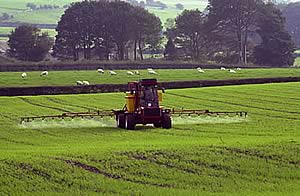 |
|||||||||
|
|||||||||||||||||||
Government's
pesticide response a vote of confidence in self-regulation The Government’s response to the Royal Commission on Environmental Pollution’s (RCEP) report on so-called bystander exposure to pesticides is a vote of confidence in the voluntary measures that farmers are taking to reduce the risks, says the NFU.
In its response, the Government rejected further statutory controls on pesticide use, in favour of a voluntary approach that allows for flexible and innovative solutions. The NFU has also pledged its full co-operation both in fostering an informed dialogue with people who are concerned about pesticide use and in resolving any problems at local level. NFU Vice President Paul Temple said: “We recognise people have genuine concerns about pesticide use and we will do everything we can to ensure those concerns are addressed. “But the clear lesson of the last few years is that, as the Government has now acknowledged, far more can be achieved by voluntary schemes such as farm assurance and the Voluntary Initiative than would ever be possible with yet more regulation. “That is a real vote of confidence in the industry and the way in which it operates. “Pesticides are a vital ingredient in modern farming systems. Not only do they protect crops from pests and diseases, but they also protect health, by enabling us to produce food that is free of moulds, mycotoxins, insects and other pests that can cause ill health. “There are a small number of complaints about health problems associated with pesticide drift and they do need to be taken seriously. But the way to address those concerns is through a combination of information and action at a local level, not by imposing a disproportionate amount of cost and regulation on an industry that has shown it is more than capable of regulating itself in this area. “Thanks to research work, such as that being carried out at Silsoe, we do know a great deal about the science of spray drift, and it is important that industry initiatives are based on that. “In the wider context, this response appears to be a clear signal, and a very encouraging one, of what the Government means by “Better Regulation”. We look forward to a similar approach being applied in many other areas of agriculture and horticulture.” Notes:
|
|||||||||||||||||||

|
|
||||||||||||||||||
| home | agri-services | pedigree
pen | news | dairy | beef | machinery property | organisations | site map |
|||||||||||||||||||

